|
|
|
Sort Order |
|
|
|
Items / Page
|
|
|
|
|
|
|
| Srl | Item |
| 1 |
ID:
154380
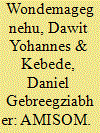

|
|
|
|
|
| Summary/Abstract |
The African Union Mission in Somalia (AMISOM) is an atypical peace support operation (PSO) that has evolved sui generis and continues to chart its own trajectory politically and militarily. With a view to contributing to the African Union (AU) Commission’s policymaking process and articulation of its PSO doctrine, this article examines AMISOM’s various distinct features, especially as they relate to the mandating process, mission support arrangements, and interactions with the Somali National Security Forces (SNSF). The article argues that there is a clear need for the AU to articulate a PSO doctrine appropriate to the types of missions which the AU undertakes, both now and in the near future. AMISOM’s initial mandating process was event-driven rather than context-driven, and the mission operated was based on a logistic supply arrangement that was at times not in sync with its overall operational demands. While the mission has multifaceted interactions with the SNSF, the interplay was fragmented, not least due to a multiplicity of actors and interests. A reading of the AMISOM experience underlines that the design of the AU’s contemporary peace missions’ doctrine should be centred on an integrated and mutually-reinforcing relationship among operations, institution-building, logistical support, and politics.
|
|
|
|
|
|
|
|
|
|
|
|
|
|
|
|
| 2 |
ID:
108441
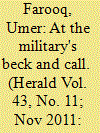

|
|
|
| 3 |
ID:
098218
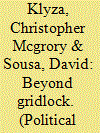

|
|
|
| 4 |
ID:
164309
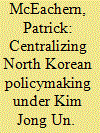

|
|
|
|
|
| Summary/Abstract |
Following the death of North Korean leader Kim Jong Il in December 2011, Kim Jong Un assumed power and gradually transformed the policymaking environment in the Democratic People's Republic of Korea (DPRK or North Korea). While some analysts expected the young and inexperienced leader to face greater hardship than his father in managing the country, in this article I argue that Kim Jong Un faced an easier transition. Kim Jong Un inherited an economy, inter-Korean relationship, and strategic landscape in foreign affairs in a relatively favorable position relative to his father's formal succession. From this position of strength, Kim Jong Un has centralized governance in the Korean Workers' Party (KWP) and his personal leadership. Drawing on internal documents and media, I show that inter-institutional debate previously observable between the party, military, and government has largely vanished under Kim Jong Un and the political roles of the military and government have receded from a comprehensive set of national policy questions.
|
|
|
|
|
|
|
|
|
|
|
|
|
|
|
|
| 5 |
ID:
090113
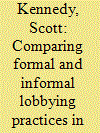

|
|
|
|
|
| Publication |
2009.
|
| Summary/Abstract |
The marketization of China's economy and the attendant need for a supporting regulatory framework have resulted in extensive lobbying by Chinese and foreign industry. The central party-state has adopted an ambivalent posture toward this development. On the one hand, the government has encouraged the development of industry associations, public hearings, and comment-and-response periods for draft laws and regulations to routinize public policy consultations. On the other hand, the central party-state is deeply concerned about the political consequences of permitting greater social activism, and hence, it continues to constrain the maturation of these same formal institutions and processes. As a consequence, informal lobbying practices, such as direct lobbying and manipulation of the media, have become more prominent vehicles for industry involvement in the policy process.
|
|
|
|
|
|
|
|
|
|
|
|
|
|
|
|
| 6 |
ID:
131062
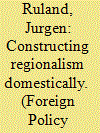

|
|
|
|
|
| Publication |
2014.
|
| Summary/Abstract |
There is a dearth of studies exploring the construction of ideas on regionalism outside Europe. This article seeks to make a contribution to close this gap. It examines the construction of ideas on regionalism in Indonesia, the largest member country of the Association of Southeast Asian Nations (ASEAN). Theoretically, the paper draws from Acharya's concept of "constitutive localization" which it develops further. It offers an alternative explanation to studies which argue that as a result of mimetic behavior, social learning, and cost-benefit calculations, regional organizations across the world become increasingly similar. While this may be the case in terms of rhetoric and organizational structure, it is not necessarily the case at a normative level. The Indonesian case shows that even though foreign policy stakeholders have increasingly championed European ideas of regional integration after the Asian Financial Crisis of 1997/1998, they have skillfully amalgamated them with older local worldviews through framing, grafting, and pruning. European ideas of regional integration thereby served to modernize and relegitimize a foreign policy agenda which seeks to establish Indonesia as a regional leader with ambitions to play a major role in global politics.
|
|
|
|
|
|
|
|
|
|
|
|
|
|
|
|
| 7 |
ID:
159826
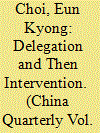

|
|
|
|
|
| Summary/Abstract |
This article reviews the decision-making process behind the creation of a new rural pension between the early 2000s and 2009. It finds that although policymaking was initially delegated to the bureaucratic level and hence involved a protracted bureaucratic struggle, the issue was resolved by a fiat imposed by top leaders rather than by bureaucratic compromise as a bureaucratic politics model would suggest. I call this policymaking process “delegation and then intervention.” Although the Ministry of Labour and Social Security (MOLSS) persistently argued in favour of creating the new rural pension, the Ministry of Finance obstinately objected to it. This study finds that when bureaucratic organizations are in conflict because of their core beliefs, rather than resource allocation, they are less likely to reach a consensus. Faced with a prolonged bureaucratic deadlock, top leaders decided in favour of the MOLSS policy initiative, thereby adopting a progressive measure that would provide a completely subsidized basic pension for the rural elderly.
|
|
|
|
|
|
|
|
|
|
|
|
|
|
|
|
| 8 |
ID:
103248


|
|
|
|
|
| Publication |
2011.
|
| Summary/Abstract |
While an interactive relationship between scholars and policymakers is generally regarded as mutually beneficial, there is also the risk of 'entrapment.' The latter occurs when scholars, once having proven their usefulness to policymakers and thereby earned their trust, become unwilling to offer dissenting opinions for the fear of risking their access and privileges. Using Asian regionalism as an example, this article argues that the development of regional institutions in Asia has benefitted from the ideas and input of the two main channels of such scholar-official interaction: epistemic communities and track two dialogues, especially during the formative stages of Asian regionalism (both economic and security). But after gaining access, scholars engaged with officialdom in developing regional institutions have found it difficult to dissent from the official line, and in challenging the shortcomings and failures of Asian regional institutions. In Asia, the danger of entrapment has been strong in authoritarian countries. In general, participation by Asian scholars in the policymaking process has suffered from the inability of scholars and think-tankers (especially the latter) to rise above the national interest and question the official position of their own governments, the ubiquitous presence and dominance of government-linked scholars or retired government officials in track two dialogues, the exclusion of social movements form many such dialogues, the presence and influence of non-specialists (in issue areas) in setting their agenda and outcome, and generational gatekeeping (failure to bring in new faces). As a result, the development of a genuine transnational regionalism has been stunted.
|
|
|
|
|
|
|
|
|
|
|
|
|
|
|
|
| 9 |
ID:
111170
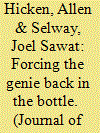

|
|
|
|
|
| Publication |
2012.
|
| Summary/Abstract |
In 2007, those behind the 2006 coup drafted a new constitution specifically aimed at turning back the political and policymaking clock to the pre-1997 era. However, in the preceding decade a significant transformation of Thai politics had taken place. Specifically, social cleavages had become politicized and particized in ways we have not seen before, and policy-focused, popular party programs had become part and parcel of serious party campaign strategies. Focusing on health policy, we thus argue in this article that institutional reforms have had predictable and observable implications for policymaking in Thailand, but only when considered in the context of changes to the broader social structure and other political conditions. While the 1997 reforms brought about a well-documented shift toward a more centralized, coordinated, and nationally focused policymaking environment, the 2007 reforms have been less successful at reversing that impact. In short, the coup makers are finding it harder than they supposed to force the genie back into the bottle.
|
|
|
|
|
|
|
|
|
|
|
|
|
|
|
|
| 10 |
ID:
139565
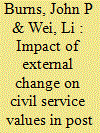

|
|
|
|
|
| Summary/Abstract |
Scholarly work in the 1990s indicated that the values of civil servants in late colonial Hong Kong were evolving from those of classical bureaucrats to those of more political bureaucrats as the political and social environment changed. Based on in-depth interviews with 58 politicians and senior civil servants carried out between 2009 and 2012, we argue that Hong Kong civil service values have adapted owing in part to external shocks such as regime change and governance reform. Still, traditional civil service values such as fiscal prudence and balancing various community interests continue to be prominent. We illustrate the influence of civil service values in two policymaking cases: small-class teaching and minimum-wage legislation.
|
|
|
|
|
|
|
|
|
|
|
|
|
|
|
|
| 11 |
ID:
130924
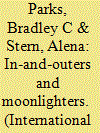

|
|
|
|
|
| Publication |
2014.
|
| Summary/Abstract |
Some international relations (IR) scholars lament the divide that exists between the academic community and the policy community. Others celebrate it. In this article, we test a core proposition advanced by advocates of bridging the policy-academy divide: that direct engagement in the policy-making process will make international relations scholars more adept at designing, undertaking, and communicating research in ways that are useful and relevant to policymakers. Using a difference-in-differences estimation strategy, we evaluate whether and to what extent direct exposure to the policy-making process influences how IR scholars select publication outlets. We define and evaluate policy-making exposure in two ways: periods of public service in which faculty members temporarily vacate their university positions to work for governments or intergovernmental organizations; and instances in which faculty members undertake substantial consulting assignments for government agencies and intergovernmental organizations. Our findings suggest that "in-and-outers"-faculty members who temporarily leave the ivory tower to accept policy positions-return to the academy with new perspectives and publication priorities. By contrast, we find no policy-making exposure effect among "moonlighters." Our results suggest that IR scholars are no more likely to publish in policy journals after doing part-time consulting work for governments and IOs.
|
|
|
|
|
|
|
|
|
|
|
|
|
|
|
|
| 12 |
ID:
183634
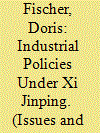

|
|
|
|
|
| Summary/Abstract |
Xi Jinping’s ascension to power and subsequent developments in Chinese governance have stoked the flames on the debate on industrial policies, both in China and across the globe. At least partly, the debate results from the perception that industrial policies have been important for China’s economic rise, growing competitiveness and drive to innovate. Outside China, this perception has already prompted some governments to suggest that their countries should react to China’s rise by also promulgating industrial policies. But inspite of the growing interest in the topic, there is hardly a consensus on the character of China’s industrial policies nor their efficiency and effectiveness, neither inside nor outside of China. This paper will shed light on these issues by looking at Chinese industrial policies from the perspective of political steering theory. It will first review the political steering theory, identify key concepts (steering modes, steering objects and subjects, etc.) and then explain the rationale of applying the theoretical deliberations to industrial policymaking and implementation in China’s EV and solar sectors. Against this background, this paper will identify different types of industrial policies and look into Chinese industrial policy development and academic discussion over time with a specific focus on changes in industrial policy steering following the inauguration of the Xi Jinping administration. This paper aims to make a conceptual contribution based on the analysis of policy documents and academic texts as well as discussions and interviews with Chinese economists and political scientists. It is part of a larger research project that focuses on how political steering through industrial policies affects China’s energy transition under Xi.
|
|
|
|
|
|
|
|
|
|
|
|
|
|
|
|
| 13 |
ID:
164410
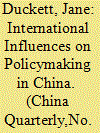

|
|
|
|
|
| Summary/Abstract |
Previous research has credited China's top leaders, Hu Jintao and Wen Jiabao, with the social policies of their decade in power, arguing that they promoted these policies either for factional reasons or to achieve rational, problem-solving goals. But such arguments ignore the dominant “fragmented authoritarian” model of policymaking in China that centres on bargaining among bureaucratic agencies. This article asks whether top leadership factions, rational problem solving, or “fragmented authoritarianism” can explain the adoption of one of the Hu and Wen administration's flagship policies, New Rural Cooperative Medical Schemes. Based on a careful tracing of this policy's evolution, it finds little evidence for these explanations, and instead uncovers the role played by international events and organizations, and ideas they introduced or sustained within policy networks. The article highlights some of the effects that China's international engagement has had on policymaking and the need to go beyond explanations of the policy process that focus solely on domestic actors. It proposes a new model of policymaking, “network authoritarianism,” that centres on policy networks spanning the domestic–international, state–non-state, and central–local divides, and which takes account of the influence of ideas circulating within these networks.
|
|
|
|
|
|
|
|
|
|
|
|
|
|
|
|
| 14 |
ID:
178228
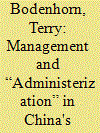

|
|
|
|
|
| Summary/Abstract |
Scholarship on university autonomy in China's higher education system in the past three decades has focused on the macro-relationship between the party-state and university leadership. This paper focuses instead on university-level management practices and college-level academic autonomy. Drawing on the discourse of “administerization” and “de-administerization” within Chinese academia, we demonstrate how the dual administration system and outdated management practices common in the higher education system limit academic quality and educational autonomy at the college level.
|
|
|
|
|
|
|
|
|
|
|
|
|
|
|
|
| 15 |
ID:
191184
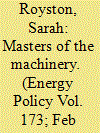

|
|
|
|
|
| Summary/Abstract |
Economic modelling plays a major role in the development, justification and evaluation of energy policies. However, there has been little investigation of how political dynamics systematically influence these models' development and outputs, or the implications for energy strategies, targets and interventions. Using in-depth interviews with 24 European modellers and policyworkers, we illuminate the politics of economic modelling within European Union (EU) energy policymaking, focusing on dynamics of contestation, differentiated influence and power relations within models' a) framing of questions and problems; b) framing of scenarios and solutions; c) structural assumptions and d) definition of quantitative data inputs. We then consider deeper questions of e) access and exclusion, showing how modelling is used to silence critical voices and reinforce incumbent interests. We argue that understanding this politics of modelling is crucial to the implementation of sustainable energy transitions. We conclude with recommendations for researchers and policyworkers seeking to promote the use of alternative/innovative models in energy policy (within and beyond the EU), centring on reflexivity; recognition; and relationship-building. Developing multi-sectoral ‘communities of practice’ around innovative modelling approaches is vital in challenging a vicious circle of evidence and policy that legitimises business-as-usual in a dangerously warming world.
|
|
|
|
|
|
|
|
|
|
|
|
|
|
|
|
| 16 |
ID:
193635
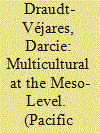

|
|
|
|
|
| Summary/Abstract |
Departing from extant studies that largely focus on gender roles, norm diffusion, or ethnonationalism, this paper highlights policy siting as one understudied factor in determining why and when states manage cultural diversity. Using the case of South Korea’s family-centred multicultural policy, the paper contributes to the growing body of literature on comparative policymaking, multiculturalism, and multi-level citizenship by foregrounding the processes by which governing elites target specific meso-level social institutions as privileged sites of diversity governance. The paper draws on immersive field research conducted between 2017 and 2023 to introduce and analyze the concept of familial multiculturalism to explain how the state locates diversity governance mainly within the family and between family and broader society. Siting diversity governance in powerful meso-level institutions like the nuclear family in shaping state multiculturalism is not unique to Korea. Rather, the paper contends that these institutions play a significant role in cultural management endeavours worldwide. While the content of a multicultural site depends on history and national context, states worldwide seek to mitigate social friction and political backlash by targeting certain intercultural relations and negating or delegitimizing others. The paper concludes with a discussion of the contemporary political ramifications of Korea’s multiculturalism and prospects for future broadening and deepening.
|
|
|
|
|
|
|
|
|
|
|
|
|
|
|
|
| 17 |
ID:
124247
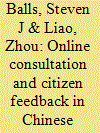

|
|
|
|
|
| Publication |
2013.
|
| Summary/Abstract |
In recent years, the Chinese government has increasingly utilized online consultation as a means of providing citizens with opportunities to offer feedback on draft laws and regulations. As little is known about the operation of online consultation, this article analyses the content of citizen feedback submitted on a revision to China's health system proposed by the National Development and Reform Commission. Citizen engagement with the political and substantive issues under consideration is crucial if online consultation is to impact government decision-making and enhance the performance of laws and regulations. This paper's main findings are that it was common for comments to address substantive issues in great depth, as well as express negative assessments of government decisions. This suggests that online consultation holds promise as an instrument of governance reform, which the Chinese Communist Party has embraced as a means of cultivating popular support.
|
|
|
|
|
|
|
|
|
|
|
|
|
|
|
|
| 18 |
ID:
103253
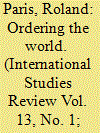

|
|
|
|
|
| Publication |
2011.
|
| Summary/Abstract |
The gap between academic research and policymaking in international relations (IR) is much lamented but poorly understood. Much of what we know about the gap is based on personal anecdotes, untested assumptions, and simplistic conceptions of what counts as policy influence. Using the literature on fragile states as a window into the research-policy interface, this article finds little evidence of scholarship directly influencing policies through specific recommendations and findings. However, academic ideas in this field appear to have important indirect effects on international policy actors - namely, by helping to define and refine understandings of state fragility as a policy problem and by informing the development of operational frameworks for responding to this problem - even though the actors themselves may not be entirely aware of such conceptual influences.
|
|
|
|
|
|
|
|
|
|
|
|
|
|
|
|
| 19 |
ID:
179546
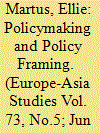

|
|
|
|
|
| Summary/Abstract |
This article examines Russian environmental politics under Putin. It explores the extent to which Putin participates in the environmental policymaking process, concentrating on his role in agenda-setting and policy development. It also investigates the way that environmental issues are framed, and their function within the political system. The findings indicate that Putin plays a key role in shaping the policy agenda but is not involved in the day-to-day policymaking. In contemporary Russia, the environment has become a tool, and on occasions, a weapon, used by Putin to serve a broader agenda. The environment represents a source of regime stability and legitimacy, important for projecting state power to a domestic and international audience, managing demands from the population, and as a way of controlling civil society. Questions remain, however, as to how sustainable this approach to environmental issues is in the longer term.
|
|
|
|
|
|
|
|
|
|
|
|
|
|
|
|
| 20 |
ID:
086463


|
|
|
|
|
| Publication |
2008.
|
| Summary/Abstract |
Over the past decade, North Korea has been undergoing a severe economic crisis, resulting in extreme food shortages, and this has inflicted great suffering upon the North Korean people. Given such dire realities in the country, it is beyond all doubt that the North Korean government must carry out comprehensive economic reforms as quickly as possible, in order to transform North Korea's present inefficient socialist planned economic system into a market economy. Many, including myself, are of the view that economic reform would certainly lead to successful economic growth in North Korea, and this would in turn enhance the legitimacy of the North Korean regime itself. Nonetheless, the regime has consistently avoided carrying out economic reform, despite being presented with many good opportunities to succeed in doing so. The July First reforms of 2002 have been half-heartedly and inconsistently applied. This then raises a simple, but very important, question: Why has the North Korean government consistently avoided adopting comprehensive economic reforms? The present study pinpoints North Korea's unique monolithic system of political control and policymaking, which has the highest level of power concentration in one individual of all political systems, as the biggest barrier to economic reform. Despite the dire need for reform, the current North Korean regime has avoided it for fear of undermining this monolithic system.
|
|
|
|
|
|
|
|
|
|
|
|
|
|
|
|
|
|
|
|
|